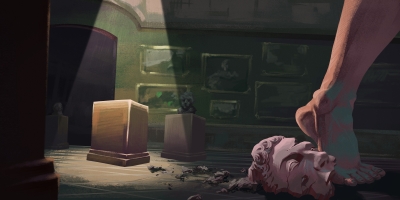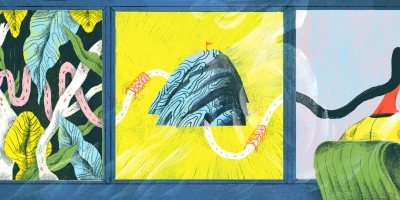Fiction
One Mirage and One Oasis
by Lynn Lurie

Candice sleeps. How can she close her eyes in a place so foreign, surrounded by people she doesn’t know? She’s peaceful in her sweatpants, a smart outfit for traveling on planes, which get cold at night, but it would seem, now, in this desert to be too warm. Her cropped hair looks coarse, not the kind you’d want to run your fingers through. It’s pulled back with a lilac headband even though her hair isn’t long enough to fall into her eyes.
I made the nametags. When the planes landed from New York, Boston, and Miami, I called out Candice and she stepped forward. She probably wishes she could have been Marie.
Candice drinks Coke for breakfast and at midmorning break. When she speaks you know she is from Texas. Although she says it is Oklahoma in her voice. She has the proper surgeon-like attitude, a practiced reserve, but she is also able to get the children to laugh. Everything about her screams outsider: her height and weight, her girlish appeal, all the blond.
The air in the hospital sits. There are no chairs. Stray dogs wander through open doors. Open a cabinet and there are no drugs, no bandages, no supplies.
A nurse tells me not to sit on the bed in the room I go into for a moment to take my feet off the floor. It is where contagious patients go, anybody with syphilis to tuberculosis and some other word I don’t know. I hurry to the sink to wash my hands. There is no soap, no paper towels.
The burns are the worst. Children with no eyelids. Some don’t make hair and have lost both ears. Fingers and toes heal like a block of marble with no functioning digits. There is the little boy whose brother lit the mosquito net above his crib. When he woke he should have been dead. Instead charred. No skin left not even an inch for grafting. Or the woman working all night in the market who came home to find the tarp burned to the ground, three children dead and two scorched every which way, a hole for a nose and a mouth.
Candice comes for the next child. This one has bandages up and down her legs, I think to cover burns. Turns out it is to hide the lice that burrow under skin and scalp and come out at night. There is a lot of commotion when they unravel the bandages. Bugs begin to jump. As she is waking from the anesthesia, we are washing her in a tub of chilly water in another ward. Her mother stands to the side. The child is screaming. I am told to translate, to tell the mother she must throw out the child’s clothes. But they are all she has. I tell her we will give her money for new clothes. She won’t do it. And really, the nurse says to me, when she gets home it will happen again. The child is whimpering as the comb goes through her hair. The nurse asks me to tell the mother she is a good mother, this happens all the time. I say it with kindness and when the mother begins to cry, I am sorry for having been gentle. Once she is deloused, we wheel her into recovery with the other children. In the courtyard I count seventeen stray cats as skinny as sticks moving slowly in search of shade.
Candice is drinking a Pepsi outside the bathroom. She tells me to go to the pharmacy and buy more lice medicine so she can wash herself clean. It would seem, I say, that given your daily diet of trouble, lice would not rank high.
Left hip cocked upward, Candice says, When I was in grade school my hair fell past my butt. I came home with head lice, and my mother chased me through the house threatening to cut it all off. I won that war. I was able to keep my hair that time. She reaches up to tuck a stray hair behind her headband. The anesthesiologist that put the child to sleep had run his fingers through her hair to comfort her, and when I ask if he wants medicine, he isn’t at first sure what I am referring to.
The week was full of things I didn’t want to see or hear: sadness I could not escape, not in the bathroom, or on the street with some made-up errand, a Coke for Diane and her diarrhea, paper for the printer, more hydrogen peroxide for my son’s infected finger. People living not much differently from animals. Children who will live an entire lifetime without. And for me and my son, who do not know how to compartmentalize despair, we have trouble plowing ahead. The parents of the patients cannot read the discharge instructions, sometimes they aren’t listening. They need something else, a consultation on this infirmity or that, even though I say I am not a doctor. It doesn’t matter, I am listening. The bright desert light, heat that burns my skin through walls of cement and sand in every wound.
It is true fifteen miles out of town there is an oasis. I took my son. In the middle of the dunes is a body of water surrounded by palm trees. Suddenly it ends and the desert, far stronger than any claim to beauty, takes hold again. It is the body’s way, and nature’s too, for coping with redundancy, with inevitability and ugliness.
The days have been long, the week nearly interminable, something like a flu fever that doesn’t break even after days of wakefulness. I put on lipstick, tired of seeing myself pale and green. My son searches for his one pressed shirt. When I can do nothing more to improve my appearance, I take the key and leave the room. A woman with hair reaching to her waist turns around. Her shirt is low. She is wearing a pushup bra. It is Candice smiling at me.
I stand next to Candice at the ceremony. She asks me what they are saying as the Mayor of Ica and the Senator from Lima express gratitude to us beneath the flag of Peru. They are seated on mahogany-carved chairs with torn velvet upholstery in a room with murals and frescos of the conquest, a chandelier of grandeur now held together with duct tape, a room forgotten by history, a remnant of a once royal empire, and I look at Candice and at her hair.
Candice, in remission, wanted to come to Peru to help these children.
They will likely live on.





